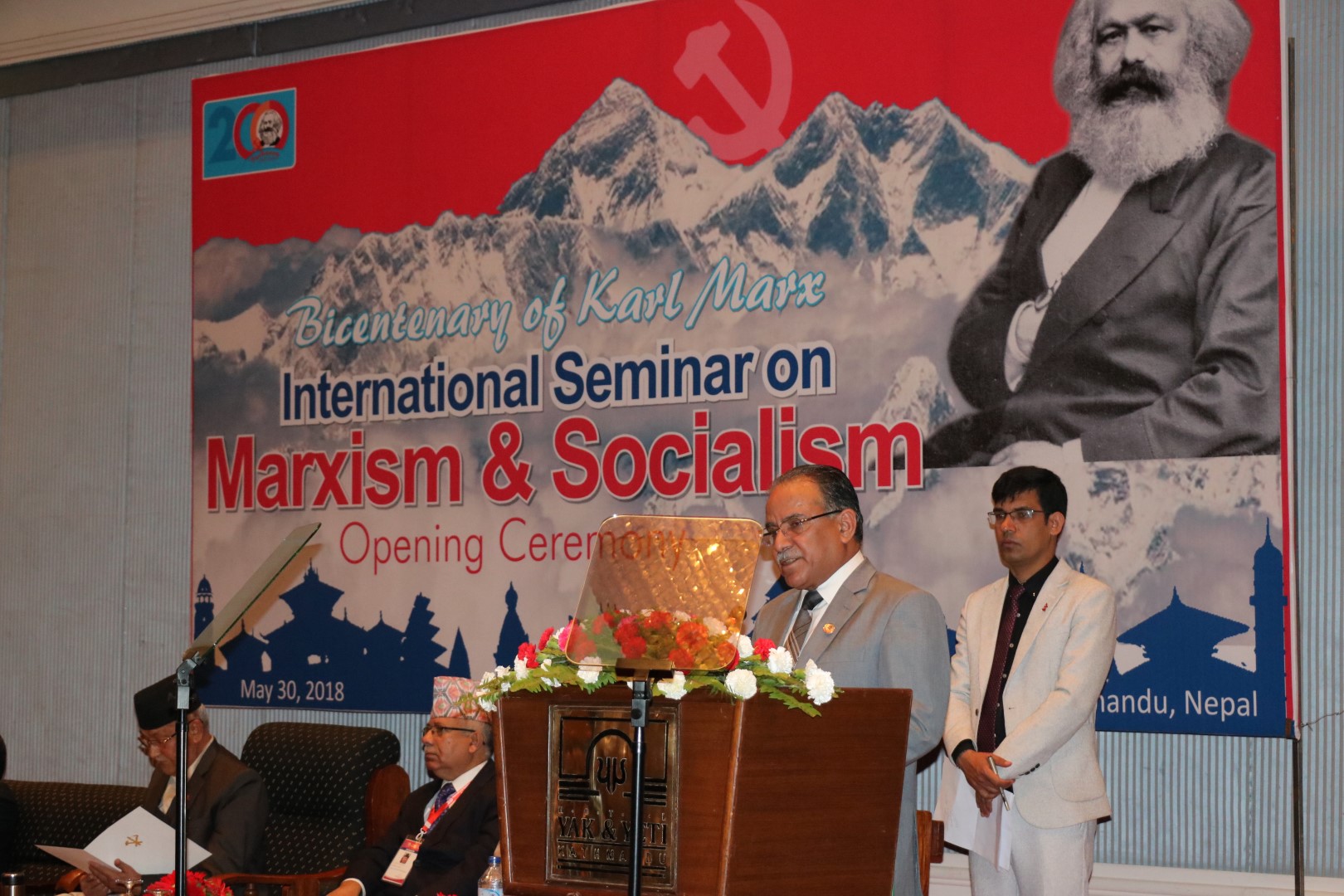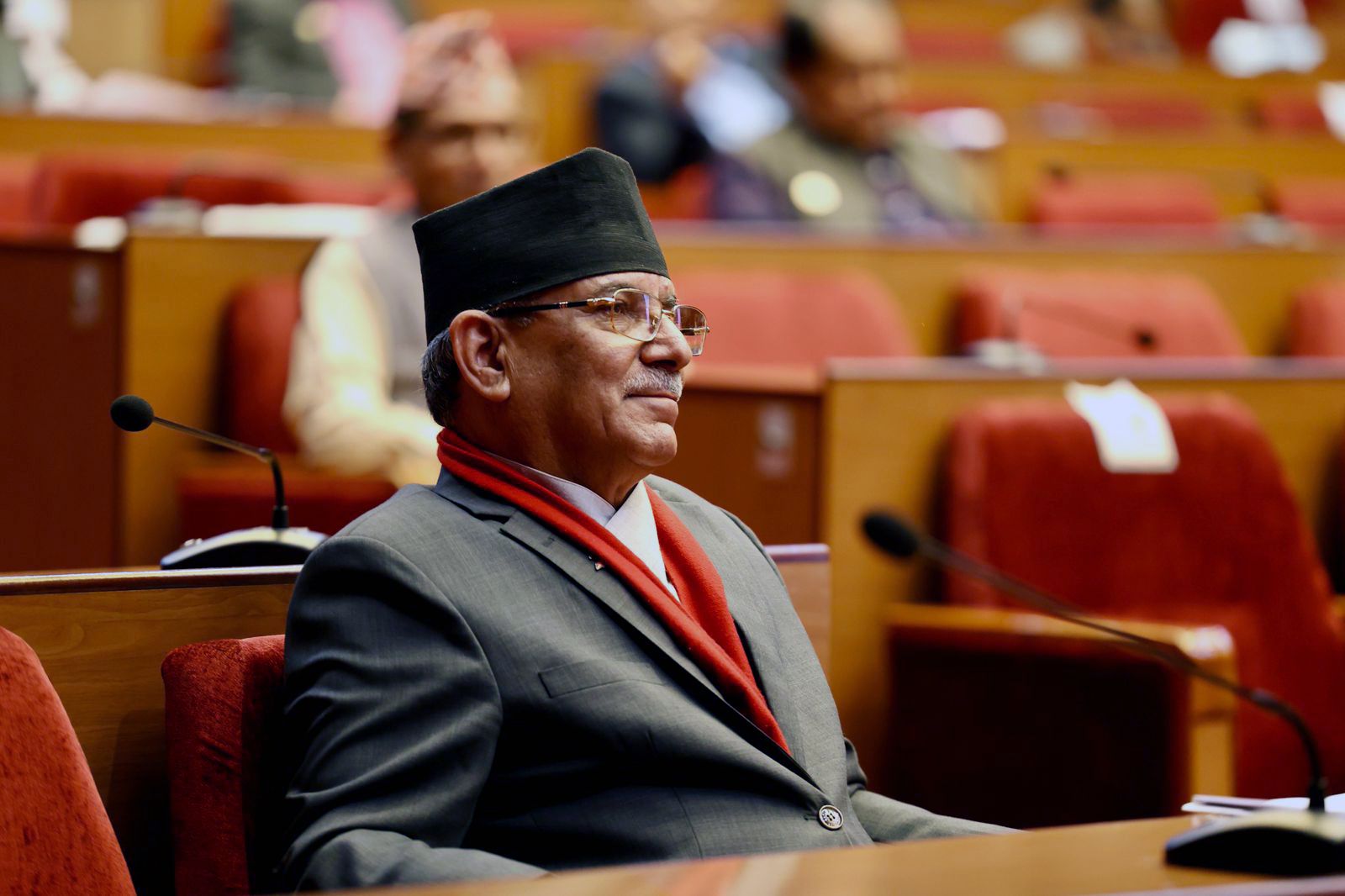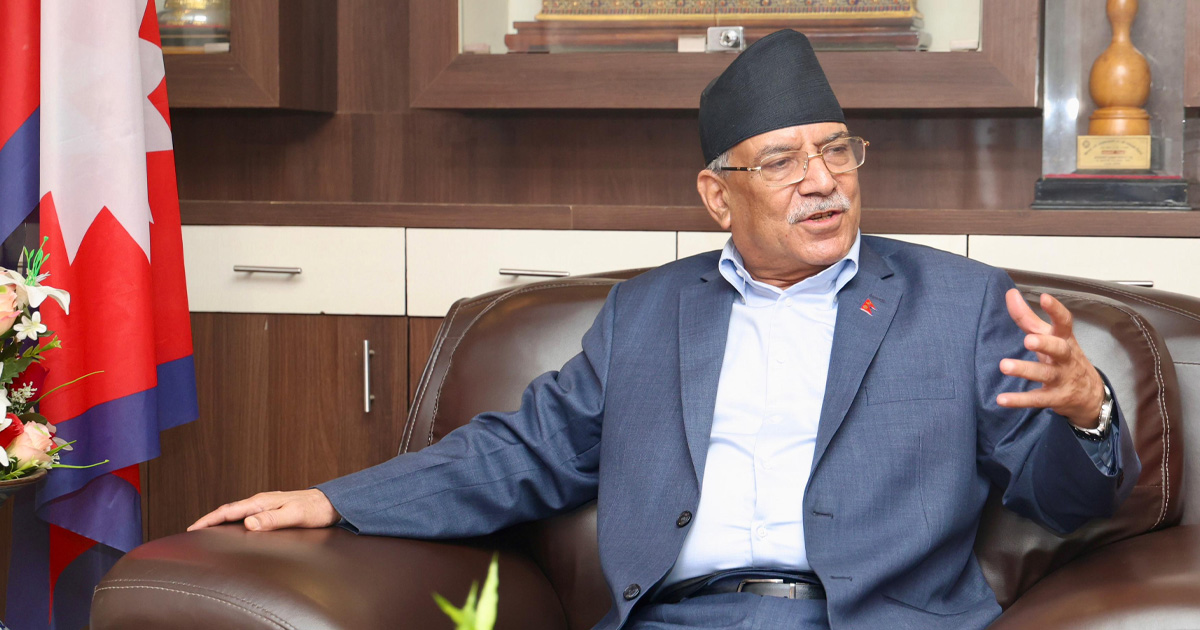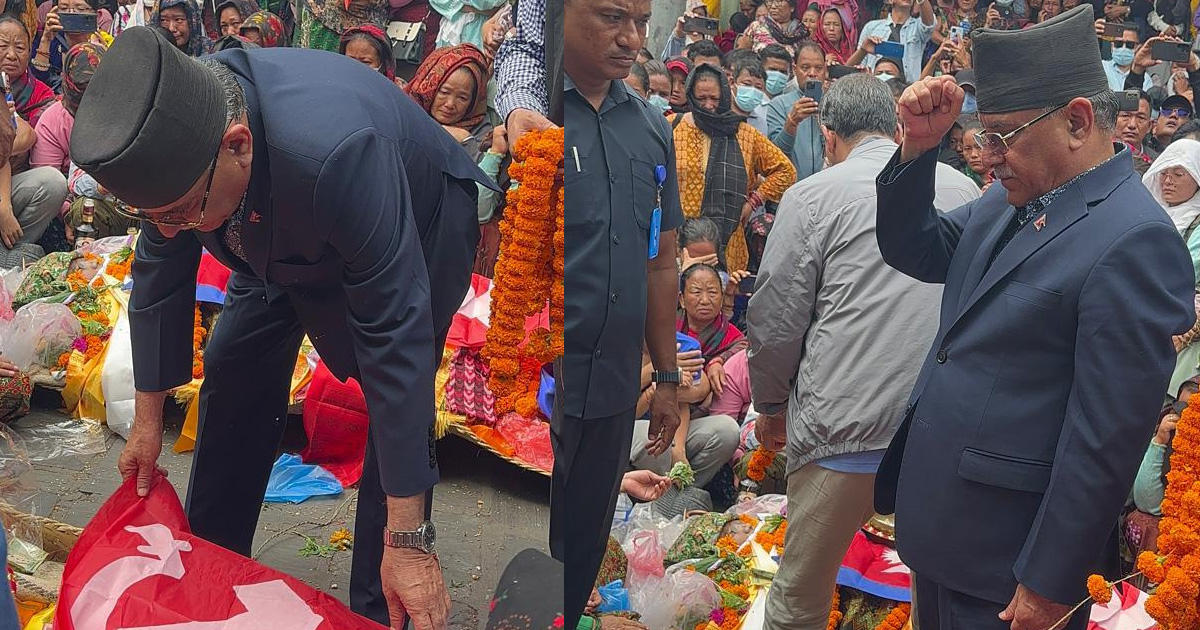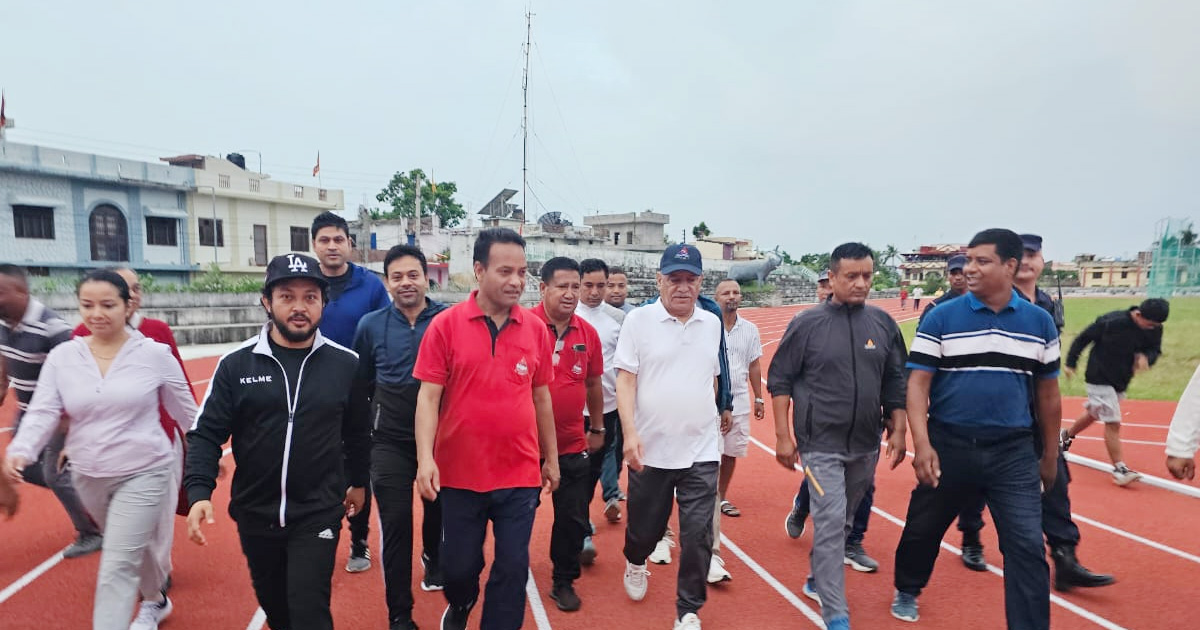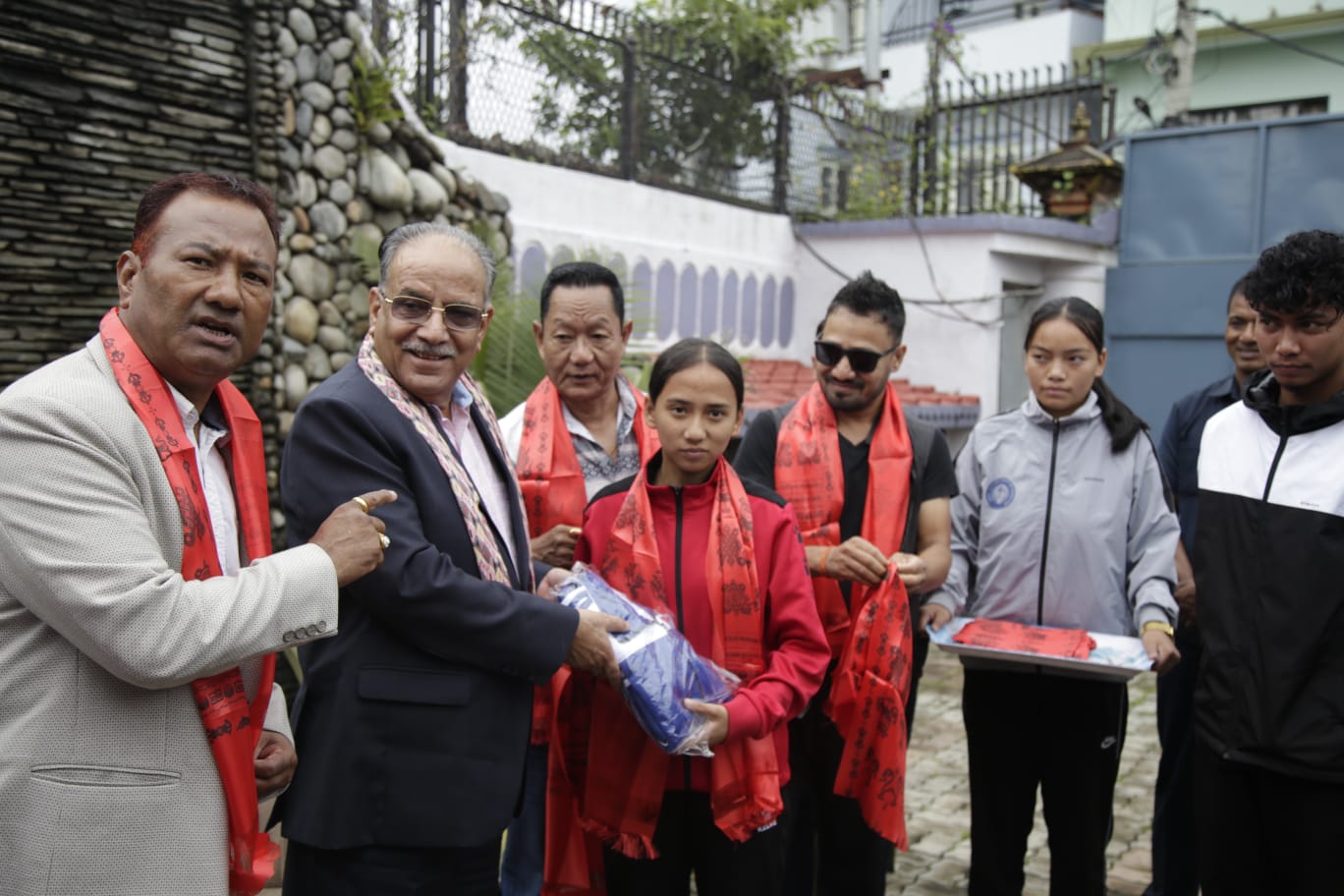Chairman of Nepal Communist party Comrade Pushpa Kamal Dahal “Prachanda” urge for socialist Revolution to world communist parties.
Addressing the international seminar on Marxism and Socialism, chairman Prachand highlighted on the characteristic of socialism in the 21st century and urged all progressive forces to unite for world socialist Revolution.
Read full speech of Chairman Prachand
I, on behalf of myself and our party, would like to extend my hearty welcome to all the national and especially international participants on this august international seminar on Marxism and Socialism organized to commemorate bicentenary of Karl Marx.
It was Marx who, in association with Engels, wrote communist manifesto where he depicted that history of entire human civilization is the class struggle between the oppressor and the oppressed with manifold gradation of social ranks. He also described that the modern society is made up of bourgeois and the proletariat. He developed dialectical materialism which explained that everything in the universe is natural which follows the laws of nature and therefore there is no existence of supernatural. Besides, everything in the universe is material where evolution is a continuous process. Beyond this, all is only man made concept which nowhere exists in the nature. These are the things which brought about a drastic shift in human beings to understand the reality of the supernatural force and the reason of their suffering which had been prevailing in the society for ages. In “The Capital”, a scientific analysis of capitalism, Marx has described extraction of surplus value is nothing other than exploitation of proletariats derived by the capitalist as their profit. He also pleaded for the value of labor which brought awareness among the proletariat to fight against exploitation. The major idea of class struggle described by Marx states that the society shall compulsorily be in antagonism as long as it is based on classes. Thus he invoked the working class to unite in the trade union to fight against the bourgeois or the exploiters. In this connection he said, “Let the ruling classes tremble at a Communistic revolution. The proletarians have nothing to lose but their chains. They have a world to win. Working men of all countries, unite!”
Struggling against the process of evolution, human beings have reached the present stage of society. Thus struggle against tyranny or obstacle of regressive forces is the right of humans. This opinion of him established the right of working class for revolution against the bourgeoisie. Marx, unlike utopian socialist, studied to understand and predict social, economic and material phenomena examining their historical trends by way of scientific method to derive probable outcomes and possible future developments and thus propounded scientific socialism. Marx and Engels stressed on the materialistic approach to understand development of human history and so the theory became popular as historical materialism.
Marx said that the struggle between haves and have-nots continues until the Globe will have classless society. Our conditions (Matters) create conflict (Dialectics) and this conflict leads to the development of human history. It was Marx who for the first time put forward the theory of dialectical and historical materialism where he states that economic forces are the primary forces which drive human beings through history. It applies evolution of productive forces and class struggle to explain history. Marx has said that capitalism is only the passing phase in the development of society.
Paris commune (March 28 to May 28, 1871) is an episode of the socialist movement where the rule of working class people was established for the first time in the history. The victory of working class to rule the society awakened the proletariats of the world to understand that they can win over the capitalists, tyrants or the exploiters. But absence of adept leadership, organizing capability, and continuation of conventional bureaucracy, the commune dilapidated within seventy days inventing discouragement-creep among the downtrodden people. However, the struggle of the proletariats in many parts of the capitalist regime did not stop. The struggle arose with a new enthusiasm. After about 56 years of the downfall of Paris commune that the great October revolution, under the dynamic leadership of Lenin, became successful to establish socialist regime in Russia. The October revolution brought about inundation of revolution in many countries of East Europe where socialist form of government i.e. the government of proletariats got established. This scenario could not limit within the boundary of physical map. The great October revolution awoke working class people across the Globe and the formation of communist parties existed steadily in all continents. The socialist countries have adopted individual model of socialism as their main political and economic structure on the basis of national characteristic.
Socialist model of agrarian revolution was adopted in Cuba, Tanzania and some socialist countries of Asia. The socialist model adopted by Chinese revolutionaries under the leadership and guidance of Comrade Mao was a model of agrarian revolution. Unlike the revolution in Russia where industrial development had taken a pace and workers could be comparatively easily organized, China had no considerable number of factory workers to organize. Therefore Comrade Mao accelerated guerilla warfare to emancipate the serfs and agriculture workers which matched the peasant base of Chinese revolution. He created peasant based people’s liberation army which, under the leadership of CPC, took power in the country. Comrade Mao launched political, social and economic reforms and included citizens in the state affairs providing them respect and protection. He emphasized on political transformation inviting mass of people of working class to achieve sufficient result of their liberation. In this way communist government was established in China embracing agrarian model of socialism.
The long and tough path travelled by socialism in China after Comrade Mao till date is a matter of comparative study to synthesize by the socialist and communist parties of the Globe. The model of Socialism applied in People’s Republic of China is the adaptation of socialism accompanied by Chinese characteristics which relies on scientific socialism reflecting people’s aspiration and fulfillment of development based on nation’s necessities. The development of China to grow as a second largest economic power despite largest human population in the world is only because of the application of socialism coinciding to their national characteristic. This has taught the communist movement in all the countries not to follow socialism of other country as stereo but to apply it on the basis of individual national realities or characteristic.
The development of socialism as foreseen by Marx has become successful in some countries of Asia. Marxism being science cannot be a dogma. It demands changes with new realities globally and locally. We have observed that imperialism and capitalism have grown very strong in the vital and crucial sectors of military and economy.
There has been a drastic reduction of number of countries with communist system. Communist parties all over the world should seriously analyze about the set back of the communist regimes It is a matter of grave concern why in many countries the communist system, supposedly controlled by and dedicated to work towards the liberation of poor and marginalized section of the society, has not been sustainable, has failed and is not in position to meet the expectation of these people. In many cases the system has collapsed and the countries have come to the old exploitative mode.
It has been a matter of debate whether the scientific system of Marxism was run dogmatically by the rulers with power or whether the contemporary social and economic analysis at the time of Marx has become redundant to the new realities of 21st century. In the mean time, the imperialists and capitalists have learnt many lessons over the years and adjusted accordingly to survive and move forward. So, it is a high time that the communist movements around the world have to grasp the correct lessons from the negative examples of the past and move ahead on the basis of ground realities with the basic tenets of Marxism.
Out of positive and negative learning and obvious weaknesses in the practice of Socialism in the 21st century, we have come to a conclusion that a thorough analysis on the original characteristics and ways of implementing it is a must to come up with a potential new model of socialism.
We ought to continue conducting as a revolutionary character; not only during our struggles, revolution and war against the feudal set up, but also during the period we ourselves are in party and governmental power while maintaining a live relationship with the people and inspiring them for the communist ideal. We can, thus, develop a successful socialism model for the 21st century.
For the 21st century peoples’ democracy (what we call Janabad) we are debating on the negative connotation of being in the government and continue ruling without bothering to obtain approval, and judgment of the people. We should rather advocate practice of peoples’ democracy by the government and within the communist party as well. The more we practice and develop peoples’ democracy by respecting the say and will of the people within the party and the government or power by empowering the people to have their live control, interference, monitoring and supervision in the party and the government, the more we strengthen peoples’ democracy within the party and the government. This, we believe, makes socialism more viable and explains the rationale of its necessity to practice it. For the communist movements this is the challenge of the 21st century to survive itself and conquer capitalism.
In Nepal, we have our own experience of defending, experimenting and developing Marxism by revolutionary and communist movements, which are similar to some specific characteristics to Nepalese context and some of sovereign and international importance.
In this context, Nepalese people under the leadership of communist parties waged both peaceful and armed struggles to liberate themselves from the age-old social, cultural, economic, religious, regional, and political exploitation.
Armed and peaceful struggles were waged by the people in Nepal in the form of Peoples’ War and Peoples’ Movements. The positive political and social changes that have occurred in the country recently are due to the correct understanding of the leadership – the need of the 21st century. We have now achieved the federal system of governance, democracy, republicanism, and inclusive nature of the state. We have thwarted the feudalism and are on the way or poised towards achieving socialist set up of the governance of the Nepalese characters.
Now, in the recently conducted local, state and national level elections, securing of near about 2/3rd of the popular votes of the people by the communist parties has confirmed the popularity and viability of the Nepalese political experiment on Socialism for the 21st century.
Recently, a political history has been created in Nepal. Our two parties, with largest following in the country, CPN (Unified Marxist Leninist) and CPN (Maoist Center), have joined together to form a single largest political entity in the country, the Nepal Communist Party (NCP).
The new party has Marxism-Leninism as guiding principle. And it recognizes and embraces the contribution of Mao towards realization of importance of socialism for the 21st century. The new party will work towards preparation of socialism with correct strategies for strengthening peoples’ democracy. The tactical line of the new party is peace, prosperity of the people and national self-dependence.
It is a ‘dream come true’ for the majority of the people who have inclination towards left politics for a long time. They were simply divided and weakened so far which restricted the process of unleashing the forces of development in the country. It is believed that there will be political stability and good governance now onwards for the general prosperity of the people with faster and sustainable development of the country.
The economic growth of Capitalist countries had been rapid till late 20th century but by the beginning of 21st century, the faster economic growth, especially of China and some other East Asian countries, has created alarming situation for North America and Europe. Some countries of Latin America have also had fast economic expansion. Social security, public education and health care have become fundamental entities of development of a country. In the political sector, protection and implementation of democratic values confirming human rights, periodic elections, multiparty democracy to test the support of the people have become the heart and soul of a democratic country. Many former oligarchic and autocratic countries have also started to follow democratic norms of rule or started to change themselves with some sort of liberal attitudes. The socialist countries in this modern ocean of new thinking should also change themselves from conventional socialist thinking to people’s yearning of 21st century. Realizing the political and social trends of the modern society, we have thus exercised socialism compatible to the modern era and to the ground reality of our country.
Talking about the socialism, we should have to focus our attention. Firstly, on improvement of democracy inside and outside of the party for the general masses of people is fundamental. Secondly, since there is a tremendous changes in the human and infrastructure development in the modern history of mankind, the Marxists today have to analyze the political and economic development of the 21st century and have to be able to develop the ideological and political line accordingly. Thirdly, the science and technology has reached to newer height of its development and everybody is qualitatively effected from such development as never before in the history. Specially, the development of information technology has compressed the world as a small village with a rapid flow and extension of small information. That has created the objective situation in favor socialism than before. We must have to be very prompt to grasp the opportunity to develop and nourish the socialism both in ideological and practical terms. Lastly, it is contextual to mention that analysis of the positive and negative lessons of the history to synthesize the new model of socialism is the historical responsibility of Marxists all over the world.
I thank you all once again for yours kind attention.
*Pushpa Kamal Dahal “Prachanda” – Chairperson. Nepal Communist Party. Presented at the International Seminar on Marxism and Socialism, Commemorating Bicentenary of Karl Marx. May 30, 2018, Kathmandu.
 क. प्रचण्ड
क. प्रचण्ड
